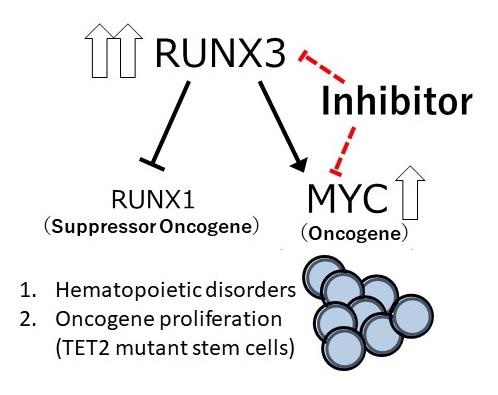
Credit: Dr. Goro Sashida
A research group from Kumamoto University, Japan analyzed the pathophysiology of myelodysplastic syndrome (MDS), a blood cancer that presents often in the elderly, and found the presence of the transcription factor RUNX3, thereby revealing a cancer growth function for what had been considered a tumor suppressor. Additional analyses of human MDS cells and model mice found an abnormal gene expression mechanism linked to the initiation and propagation of MDS stem cells, and confirmed RUNX3 as a new therapeutic target.
MDS is a refractory cancer that is resistant to anticancer drugs. It originates from hematopoietic stem cells and causes hematopoietic failure. Recent advances in comprehensive DNA sequencing analysis have largely revealed the major genetic mutations within MDS but much remains unknown about the mechanisms that cause it. Thus, the International Research Center for Medical Sciences (IRCMS) research group turned their focused toward the transcription factor RUNX3 and investigated its role in the development of MDS.
They first analyzed the correlation between RUNX3 expression levels in human MDS cells and life prognosis, and confirmed that patients with higher RUNX3 expression had a worse prognosis. Next, since RUNX3 expression in human MDS cells has a high frequency of mutation in TET2 gene, they created RUNX3-expressing MDS model mice deficient in the TET2 gene. RUNX3-expressing TET2-deficient MDS cells were found to suppress the expression level and function of RUNX1, a transcription factor in the same gene family as RUNX3 and is essential for normal hematopoiesis. This indicates a new mechanism of cancer development that suppresses normal functions through interactions between family genes. The researchers also found that RUNX3 cooperates with the MYC gene, a known oncogene, to grow MDS cells. Inhibition of MYC function significantly suppressed the proliferation of RUNX3-expressing cells.
“Further progress in future research is expected to lead to the development of new therapeutic methods targeting the transcription factor RUNX3 in the refractory cancer myelodysplastic syndrome,” said Professor Goro Sashida who lead this study. “Our results are also expected to be beneficial in the study of other hematological cancers where the transcription factor RUNX plays an important role such as Down’s syndrome-related leukemia.”
###
This research was posted online in Cancer Research on 27 April 2020.
[Source]
Yokomizo-Nakano, T., Kubota, S., Bai, J., Hamashima, A., Morii, M., Sun, Y., … Sashida, G. (2020). Overexpression of RUNX3 represses RUNX1 to drive transformation of myelodysplastic syndrome. Cancer Research, canres.3167.2019. doi:10.1158/0008-5472.can-19-3167
Media Contact
J. Sanderson & N. Fukuda
[email protected]
Related Journal Article
http://dx.




